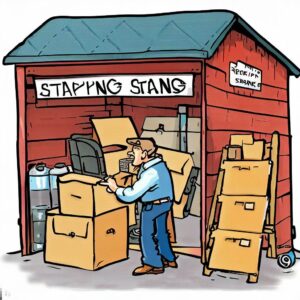Starting up a storage unit business requires careful consideration of several important factors. From conducting thorough market research to selecting the optimal location for your facility, there are many critical steps involved in launching a successful storage business. This article aims to provide valuable insights and guidance on the key steps that you need to take to ensure the success of your storage unit business venture. Whether you’re a first-time entrepreneur or an experienced business owner, following these steps can help set you on the path to achieving your goals and building a thriving business.
Conduct Market Research
Conducting thorough market research is a critical step that should not be overlooked when starting a storage unit business. It lays the foundation for identifying your target market and understanding their needs and preferences. You can use this information to create a unique value proposition that sets you apart from competitors and informs your marketing strategy.
To conduct effective market research, start by defining your target market based on demographic and psychographic factors, such as age, income, lifestyle, and behavior. Then, use both primary and secondary research methods to gather data on the demand for storage units in your local area. Primary research involves collecting data directly from potential customers through surveys, focus groups, and interviews. Secondary research involves analyzing existing data sources, such as government statistics, industry reports, and competitor websites.
Some useful sources of secondary data for storage unit businesses include the U.S. Census Bureau and the Self Storage Association. The Census Bureau collects data on population and household characteristics, which can help you understand the size and composition of your target market. The Self Storage Association provides industry-specific data on market trends, customer behavior, and operational benchmarks. You can also analyze competitor websites to gather information on their pricing, services, and promotions.
Market research is an ongoing process that should inform all aspects of your storage unit business, from product development to customer service. By staying up-to-date with industry trends and customer preferences, you can adapt your business to meet changing market demands and build a loyal customer base. Remember to always use reliable sources and analyze data objectively to make informed decisions that drive business success.

Choose a Suitable Location
Selecting the perfect location for your storage unit business is crucial and can be a determining factor in whether or not you will succeed. It is important that you carefully consider and evaluate all aspects of potential locations before making a final decision.
One of the most critical factors to keep in mind when selecting a location is accessibility. Your storage facility should be easy to reach, with direct access from main roads and highways. Clients will appreciate being able to conveniently drop off and pick up their belongings without having to travel out of their way or navigate through confusing side streets. Additionally, being visible from major thoroughfares will increase your exposure and draw attention to your business.
Another critical element to consider is zoning regulations. To operate a storage unit facility, you must ensure that the property you choose is zoned for commercial use. Otherwise, you may run into issues with local officials and face fines and penalties. You can easily check your local zoning regulations by visiting your city or county government website. If you have any questions or concerns about zoning requirements, it’s always a good idea to consult with a real estate attorney or zoning specialist.
Finally, don’t forget to consider parking space. Your customers will need ample room to maneuver their vehicles and load and unload their belongings. Be sure to choose a location with plenty of parking spaces available to avoid frustration and lost business.
The location of your storage unit business is one of the most important factors in determining your success. By choosing a site that is easily accessible, visible, properly zoned, and has adequate parking space, you can improve your chances of building a thriving and profitable business.

Create a Business Plan
A meticulously devised business plan is a fundamental aspect of any successful business venture. Not only does it serve as an essential tool for securing funding, but it also acts as a roadmap to guide you through the various stages of establishing and running your business. To ensure that your business plan covers all the necessary elements, there are several key areas that you should focus on.
Your mission statement is the foundation of your business plan and provides an overview of the purpose and goals of your business. Your financial projections are another critical component and should include realistic estimates of revenue, expenses, and profits. A comprehensive marketing strategy that outlines how you will reach and engage with your target audience is also essential. An operational plan detailing how you will run and manage your business is also necessary.
Fortunately, there are free resources available to help you create a well-crafted business plan. The Small Business Administration (SBA) offers a wealth of information, including online courses, webinars, and templates to assist you in developing a comprehensive plan. Additionally, there are numerous business plan software programs available that can guide you through the process of creating a professional and effective plan.
A well-designed business plan is vital to the success of your business. It should include your mission statement, financial projections, marketing strategy, and operational plan. Utilizing the resources provided by the SBA or investing in a business plan software program can help ensure that your plan is both comprehensive and effective.

Obtain Necessary Permits and Licenses
When starting a storage unit business, it is essential to ensure that you have all the necessary permits and licenses to operate legally. The licensing requirements vary depending on the state and locality in which your business operates, so it’s crucial to research and comply with the specific regulations for your area.
The first step is to check with your local government website or licensing office to determine what permits and licenses are required. This typically includes obtaining a business license, registering with the state, and securing any necessary zoning permits. Depending on your location, you may also need to obtain a construction permit if you plan to build a new facility or make significant renovations to an existing structure.
In addition to obtaining the necessary permits and licenses, it’s also important to ensure that you comply with all applicable laws and regulations. This includes following fire safety codes, meeting building code requirements, and complying with any environmental regulations that may apply to your business.
Operating without the proper permits and licenses can result in fines, legal action, and even the closure of your business. Therefore, taking the time to research and comply with all the necessary regulations is critical to the success of your storage unit business.
Acquiring the necessary permits and licenses is a crucial step when starting a storage unit business. Be sure to check your state and local government websites and comply with all the regulations to avoid legal issues and to operate your business efficiently and effectively.

Secure Funding
Starting a storage unit business requires a significant amount of upfront capital, as there are many expenses associated with setting up the business, such as purchasing land or leasing space, constructing or renovating the facility, buying equipment, and marketing the business. Fortunately, there are several options available for securing funding.
Traditional bank loans are a common option for obtaining funding. Banks typically require a solid business plan, financial projections, collateral, and a good credit score to qualify for a loan. The Small Business Administration (SBA) also offers various loan programs that provide financing at lower interest rates than traditional bank loans. To qualify, you’ll need to demonstrate a strong business plan, collateral, and good credit history.
Private investors are another option for securing funding. These can include family and friends, angel investors, or venture capitalists. Private investors typically invest in businesses that show high growth potential and have a well-crafted business plan and financial projections.
To increase your chances of obtaining funding, it is essential to have a solid business plan and realistic financial projections. Your business plan should include a detailed analysis of the target market, competition, marketing strategy, and operational plan. Financial projections should be based on realistic estimates of revenue, expenses, and profits.
Starting a storage unit business requires significant upfront capital, but there are several options available for securing funding. Traditional bank loans, SBA loans, and private investors are all viable options. It’s crucial to have a solid business plan and financial projections to increase your chances of obtaining funding and building a successful business.

Purchase or Lease Property
Once you have secured funding, the next step in starting your storage unit business is to purchase or lease a facility that meets your needs and budget. When acquiring property, it is critical to ensure that all legal requirements are met, and the transaction is legally sound.
If you are purchasing property, consider hiring a real estate attorney with experience in commercial transactions. Your attorney can help protect your interests and negotiate favorable terms in the purchase agreement. This includes ensuring that the property has all the necessary permits and licenses, addressing any zoning issues, and verifying that there are no liens or other encumbrances on the property.
If you are leasing property, negotiating favorable terms with the landlord is essential. Some aspects to consider include rent, maintenance responsibilities, length of the lease, and renewal options. It’s also important to review the lease agreement carefully and seek legal advice if necessary to ensure that you understand all obligations and restrictions.
In addition to these considerations, you’ll also need to evaluate the physical aspects of the property, such as location, size, accessibility, and security. These factors can significantly impact the success of your business and should be considered carefully when selecting your storage facility.
Once you have secured funding for your storage unit business, choosing the right facility is critical to your success. Whether purchasing or leasing, it’s important to ensure that all legal requirements are met and to negotiate favorable terms. Consulting with a real estate attorney and reviewing the lease agreement carefully can help protect your interests. Additionally, evaluating the physical aspects of the property can help ensure that your facility meets your needs and attracts customers.

Design and Construct Your Facility
Designing your storage facility to maximize space and provide easy access for customers is crucial to the success of your business. Several factors should be considered when planning the layout of your facility, including unit size, layout, security features, and climate control.
Unit size is an essential consideration because customers will have different storage needs. Offering a range of sizes can help ensure that you attract a broad customer base. The layout of the facility should also be designed to optimize traffic flow and make it easy for customers to navigate. This includes ensuring that there is enough space for vehicles to maneuver within the facility and that units are organized in a logical and accessible manner.
Security features are also essential to consider when designing your storage facility. This includes implementing measures such as surveillance cameras, gated access, and individual unit alarms to enhance the security of the property and give customers peace of mind. Additionally, offering climate-controlled units can help protect customers’ stored items from damage due to extreme temperatures or humidity.
When constructing your facility, it’s critical to hire a reputable contractor who has experience in building storage facilities. Your contractor should be knowledgeable about local building codes and ensure that all construction meets these requirements. This includes ensuring that the facility is structurally sound and able to withstand severe weather conditions.
Designing a storage facility that maximizes space and accessibility for customers is crucial to the success of your business. Factors such as unit size, layout, security features, and climate control should all be considered when planning the facility’s design. Hiring a reputable contractor who is knowledgeable about local building codes is also essential to ensure that the construction is safe and meets all requirements.

Market Your Business
Marketing is a crucial component of building and growing your storage unit business. It’s essential to create brand awareness and attract customers to your facility. There are several strategies you can use to promote your business.
One effective way to reach potential customers is through social media platforms. Create profiles for your business on Facebook, Instagram, and Twitter and regularly post updates about your facility, such as promotions, events, or new offerings. Engage with your followers by responding to comments, messages, and reviews to help build trust with potential customers.
Local advertising is also a useful tool for promoting your business. Consider placing ads in local newspapers, magazines, or online publications that target the community you serve. You can also invest in outdoor advertising, such as billboards or signs, to increase visibility for your business.
Community outreach programs are another excellent marketing strategy. Consider sponsoring a local event, donating to a charity or school, or holding an open house or customer appreciation day to increase awareness of your business in the community.
Offering promotions and discounts is an effective way to entice new customers to try your facility. Consider offering a discount for first-time renters or a referral program that rewards existing customers for referring friends and family.
Finally, providing excellent customer service is critical to retaining customers and building loyalty. Ensure that your staff is knowledgeable, friendly, and responsive to customer needs. Offering amenities such as 24-hour access or online bill pay can also improve the customer experience.
Marketing is essential to attract customers and build brand awareness for your storage unit business. Utilizing social media platforms, local advertising, community outreach programs, promotions, and discounts can all be effective strategies. Providing excellent customer service is also crucial to retaining customers and building loyalty.

Conclusion
Starting up a storage unit business requires careful planning, hard work, and dedication. By conducting thorough market research, choosing a suitable location, creating a solid business plan, securing funding, obtaining necessary permits, and marketing your business effectively, you can achieve success in this dynamic industry. Remember to stay up-to-date with industry trends and continually improve your services to provide value to your customers.
